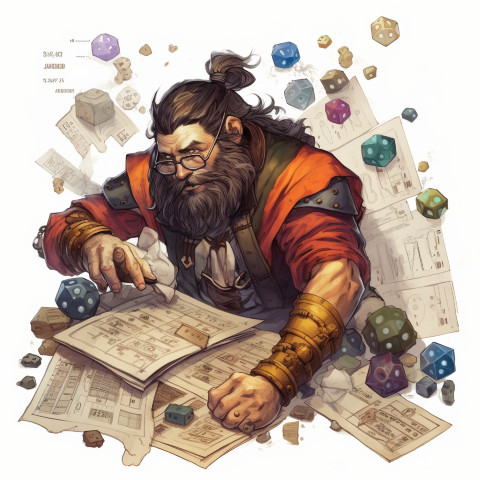In the diverse world of Tabletop Role-Playing Games (TTRPGs), the progression system you choose can significantly influence the way your campaign unfolds. In 5th edition Dungeons & Dragons (D&D), two popular methods of character progression exist: Experience Points (XP) and Milestone Advancement. While Milestone Advancement has its merits, I am here to make a case for XP, an often overlooked, but immensely beneficial system.
In a previous post I discussed the Zen of Awarding Experience for Roleplaying which demonstrates an easy method for awarding non-combat experience. DMs can apply this to exploration or any activity beyond killing creatures. Chapters 8 and 3 of the 5e DMG also provide some guidance on this as well. I had a recent exchange online that helped me summarize what I see the forgotten benefits of using XP are. I thought I’d share them here.

Building a World One XP at a Time
XP connects characters to their actions within the world. Each monster slain, each trap disarmed, every cleverly negotiated encounter, earns the characters XP, helping them grow stronger and more skilled. This system offers a tangible reward for engaging with the world, breathing life into the setting and making it matter to the players.
Milestone advancement, on the other hand, rewards characters simply for reaching certain points in the narrative. While this can create a clear path of progression, it misses a fundamental aspect of immersive role-play: the player’s interaction with the world. Milestone Advancement risks reducing the world to a mere backdrop against which the narrative unfolds, rather than an integral part of the story.
Pacing and Enjoying the Adventure with XP
An often overlooked benefit of using XP is its influence on the game’s pacing. By linking character progression to actions within the game, XP allows the pace to ebb and flow naturally. It’s not a rigid timer, but a flexible measure of progress that reflects the story’s rhythm and the players’ actions. This fluidity also encourages players to immerse themselves in the unfolding events rather than racing to level up every few sessions.
Moreover, the XP system allows players to savor the charm of lower level play. Personally, I find D&D 5e most enjoyable at levels 7 or below, with a sweet spot between levels 3 to 5. Using XP slows down the game just enough to let players fully experience the content. It provides players, particularly newcomers, with ample time to familiarize themselves with their class abilities, deepening their connection to the game and enhancing their overall experience.
A Diversity of Incentives
XP offers a flexible incentive system that can be tailored to the style of your campaign. Too often, DMs limit XP rewards to combat encounters. However, XP can be a motivating factor for a variety of actions. Award XP for clever problem-solving, negotiating with NPCs, or even for great role-playing moments. This diversity of incentives can drive engagement, encouraging players to think creatively and interact with the world in unique ways.
A Log of Memories
Tracking XP can also provide an unexpected benefit: a log of your campaign’s major events. By noting down the sources of XP, you create a record of the group’s achievements and memorable moments. This can add depth to your campaign, fostering a sense of nostalgia and achievement as players look back on their journey.
Addressing D&D’s Reward Structure
However, it’s also crucial to critique the overall reward structure in D&D 5e. Wizards of the Coast, in their bid to make the game more appealing, have filled character classes with numerous abilities. While this empowers players and adds complexity, it also creates a potential issue.
The plethora of class features reduces the need for external rewards such as magical items or gold, thus diminishing the need for characters to interact with the world. This can lead to characters feeling disconnected from the setting or campaign.
Using XP is a small tool to combat this issue. By tying character progression to specific actions and outcomes, XP can reestablish a tangible connection between the characters and the world. It reintroduces the necessity of exploring, negotiating, and engaging with the campaign setting, fostering a more immersive role-playing experience.
A Word of Caution
While XP offers numerous benefits, it’s essential to be mindful of what you award XP for. Avoid giving XP for actions that undermine the spirit of the game, such as unnecessary aggression or disruptive behavior. XP is a tool to guide your players, encouraging them to engage in ways that enrich the campaign. Also, don’t fall into the trap of awarding XP to correct bad behavior at the table. Many DMs who use XP look at negative player behavior and think and easy solution is to award experience for things like collaborating or showing up on time. This seems attractive, but using in game incentives to address out of game issues will always come back to bite you. If there is behavior that needs to be address, do that, but don’t fall into the trap of thinking in game rules will correct bad player behavior.
Conclusion
In conclusion, XP is more than just a mechanic for character progression. It’s a tool that, when used correctly, can foster engagement, enhance immersion, and create a richer, more rewarding D&D experience. In 5th edition, our tools for connecting players to the world are few. Finding fun ways to do that can help build a more holistic narrative and immersive experience for all. What do you think though? How has experience worked for you in the past? Would you be tempted to give XP a try after reading this or are you ride-or-die on Milestone? Drop me a comment over on twitter to let me know what you think.